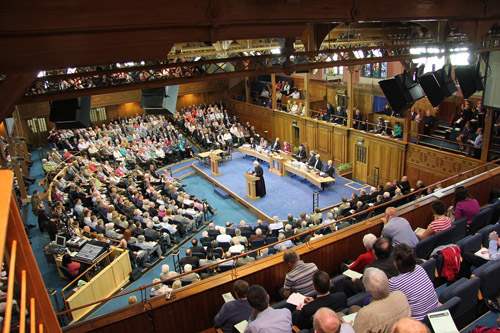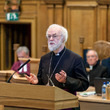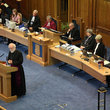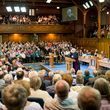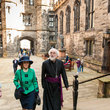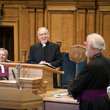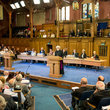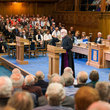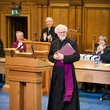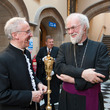Archbishop's address to the General Assembly of the Church of Scotland
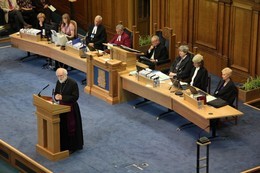
Wednesday 23rd May 2012
The Archbishop of Canterbury, Dr Rowan Williams, delivered an address to the General Assembly of the Church of Scotland in which he discussed the various challenges facing both the Church of Scotland and the Church of England.
The full text of the Archbishop's address follows, or listen to an audio recording [16Mb, 16 mins] or watch the video recording.

Address of the Archbishop of Canterbury
to the General Assembly of the Church of Scotland
General Assembly Hall, Edinburgh, 23 May 2012
Moderator,
Dear Brothers and Sisters in Jesus Christ:
I feel greatly privileged to be invited to address this great gathering and to bring the greetings and prayers of the Church of England to you. And may I express my thanks for the invitation, for your welcome, and for the hospitality of His Grace The Lord High Commissioner. This Assembly is, I know, one of the great historic councils of the British Isles, which has for centuries been the forum for a whole nation's reflection on the most serious ethical and public questions facing Scotland. If there is now another such forum, in the shape of the Scottish Parliament, that does not take away the solemnity of this meeting, seeking, as it does, to bring the light of Christ to bear not only on its own business but on the concerns of this society.
Because the Church exists as a result of the call of God, the main purpose of any Christian assembly is simply to ask, again and again, 'What is the Church called to here and now?' And a 'national' church—this is true for the Church of Scotland and the Church of England in equal measure—is one that believes that the call of God can be heard not only in Scripture and the prayerful discernment of believers gathered together but in history and society. God calls us through the medium of where we are and what we have inherited. But the crucial thing is to remember that it is still God's call we are listening for, not that of history or society themselves. For God calls us to take responsibility for the welfare of the city where we are sent, working to unveil the signs of his Kingdom and to open up what can seem to be a closed, atomised world to the transfigured relationships of God's own commonwealth. History and society may convey to us the call and the judgement of God, but this does not mean we must simply follow their lead and reproduce their assumptions. They offer an agenda, but not a resolution, so to speak – let alone (if I may borrow the wonderful phraseology of the Assembly) a Proposed Deliverance!
We who share the experience of a church life deeply bound up with national identity and national vision might well reflect together on one particular scriptural phrase, which for many of us has an immense resonance. In St John's Revelation, the ascended Lord says to the Church in ancient Philadelphia, 'I have set before you an open door that no-one can shut' (Rev 3.8): he, the Alpha and Omega, the firstborn from the dead, is the one who, in any and every human situation, is able to transcend what we think are the limits and possibilities before us, to open doors. It is one of the great affirmations of why we are able to continue to trust in the Church's future, even when so much of what we see is troubling, chaotic or weak. That is very much its context in the address to the believers in Philadelphia; it still sounds a painfully true note in our own context, whether north or south of the Border – and indeed west of another border, as the disestablished Welsh Church which I had the joy of serving for many years still has many of the same features. Faced as we are with the signs of division, irresoluble conflict, preoccupation with internal problems, it is sometimes tempting to focus on the weakness or the chaos; yet we are called to confidence in the Church because of our confidence in the Church's Lord.
But there are two interlocking ways of reading this vision of an open door in the Risen Christ; and our specific experience as 'national' churches may help us see this clearly. On the one hand: wherever we are, it is our responsibility to hold the door open for those who need the life of the new creation. The Church is there to hold open the possibility of encountering the reality of God's commonwealth, the reality of mutual communion, intimacy with God, joy in one another and in God's works in creation and redemption. On the other hand: before us stands an open door into the life of the community around us. We have been gifted with the possibility of entering into the deepest places in people's lives, precisely because we have so long been a part of the cultural furniture of our society. We can be complacent or passive about that – or we can see it as an extraordinary privilege that allows us to be alongside so many in their vulnerability and their celebrations. That openness to the local reality of the Church that comes with the history of a national role for the Christian community must mean, if it means anything truly Gospel-shaped, that God, by opening the culture to us, has given us a way of opening the culture to him and to his Kingdom and his future. We are here to be custodians of an open door in both directions, holding the door open to our neighbours, holding the door open for our Lord.
But how do we translate this into the language of practical priorities for the Church? Well, God forbid that I should try and tell another Christian family its business. But perhaps you'll allow me to think out loud about this in relation to my own Church, in the hope that you may hear echoes and recognise at least some of the same challenges.
And the first reflection I want to offer has to do with the language we so often use about maintaining a Christian presence in every community in the land – an ideal that we usually acknowledge as part of the inheritance and vocation of a 'national' church. I believe that this is every bit as crucial as people say. But what do we mean exactly by a 'Christian presence'? A particular kind of building? A regular congregation of the familiar sort? Well and good, if that is possible; but it isn't always, and we need to be thinking harder about what else it might mean, without for a moment letting go of the core vision of universal presence.
Perhaps we can re-cast the question. What is it to hold the door open in every community in the sense we have been exploring? This becomes a question about how we seek as a Church to guarantee that every community is able to see signs of God's commonwealth somewhere in their neighbourhood – a question that is not answered only by thinking about the traditional building or congregation. So if a traditional parish is faced with problems about sustaining the inherited pattern of worship because of the shortage of ordained ministers, I suspect that the answer lies neither in simply closing a building nor in seeking to maintain a shadow of the traditional style. It may lie rather in two other kinds of response. First, there is the question of how to keep worship visible, even if it is less regular – and that needs collaboration with neighbouring parishes and other denominations, and it may involve less frequent but larger scale events. Second is the challenge of looking locally to find which groups and bodies are most likely to be in tune with the vision of an open door into a radically fresh kind of community life or service and explore how the Church's local resources can assist their visibility.
I think here of the extraordinary experiment of the Revd John Morgans of the United Reformed Church on the Penrhys estate in South Wales. Deliberately moving into a community with no established church life of any kind, remote from the traditional buildings and habits, John and his wife Norah built up a regular pattern of worship in the heart of the estate, converting two middle-sized council houses into a church centre with a café and a second-hand clothes shop. The practical usefulness of this to the community meant that people sensed an 'open door' – and when they came to drink coffee or to shop, they often dropped in to the prayer space. Increasingly there was collaboration with community services, including the development of a clinic. The Church's visibility worked in support of the visibility of other community resources. This was a community where an open door could be seen.
How this translates to, say, a rural setting is a challenging question; but we have seen, for example, rural church buildings being reimagined as post-offices, citizens' advice centres or occasional farmers' markets, while worship is regularly conducted on a rota in people's homes, with the historic church building being reserved for big events. The point is how we work to make different futures imaginable, how openness to a different kind of society becomes tangible in a locality. There are no quick and magical solutions; but at least it may be helpful to see if a new way of putting the question will take us forward.
Openness to a different society: this leads me on to my second reflection. You have been discussing the excellent report of your Commission on the Purposes of Economic Activity; and this document rightly stresses the need for new models of economic activity, based on the co-operative vision, as well as a renewal of the ethical commitments of business. Keeping the door open will mean, in this connection, modelling different possibilities – through investment policies, the encouraging of co-operative ventures among church people (a group in the Church of England is currently developing a credit union for its clergy and employees), programmes for ecological responsibility in local churches and so on. It will mean nurturing such possibilities in a local community – through volunteering, making premises and services available, helping to recruit and publicise. And it will mean risking – pushing the boat out in advocacy for justice abroad as well as at home, a calling to which the Church of Scotland has historically responded with impressive consistency and energy. Modelling, nurturing and risking – all these are to do with keeping the door open, in the Church and for the Gospel.
But the third and last reflection I want to offer is obviously the most fundamental. When the Church is at worship, does it look as though it is listening to and for a call from elsewhere? Does it look as though it is itself looking through an open door, the 'open door in heaven' of Revelation 4? When the Church gathers to open itself corporately to God, it is no longer a 'national church'; it is the Church Catholic, the Body of Christ praying his prayer, in the sacrament of the Lord's Supper and in patient, repentant listening to God's Word. Gathered in this way, it shows to the world around the context in which that world exists – the global context of the universal Church of all places and ages, the cosmic context of the activity of the eternal Word, holding all things in being and presenting them to the Father in the Spirit, with the realities of the cross, the resurrection and the ascension at the centre of this priestly act. If we cannot make this level of 'openness' a reality, the rest fails. Our search for local presence, for effective modelling of the Kingdom, all this depends on our own awareness, acted out time after time in our liturgy, that we have been brought into a new world of intimacy with God and joy in his abundant life. George Macleod loved to quote when he began his public prayers the hymn beginning, 'We are coming to a King, / Large petitions let us bring'; and my own memory of hearing him utter those words forty years ago is a memory of revelation, a sudden sense of what it meant to enter the heavenly sanctuary with the ascended Christ.
So if our task as Church is to hear the call of God, and if that call is to witness to the open door set before us by Jesus, there are some of the challenges it might entail –
- to rethink what it is to be present in every community;
- to embody the possibilities of transformation and joy that our society, deliberately or not, tries to extinguish;
- and to show that society that it lives in the midst of glory, judgement, mystery, beauty – the new world on the other side of the door.
No one Church can be adequate for these tasks, here in Scotland or anywhere else. My prayer is that we shall learn with and from one another as we seek to hold that door open – rejoicing together that we are ourselves invited in to be at home with Christ: 'I will come in and eat with them and they will eat with me' (Rev 3.20).
© Rowan Williams 2012
